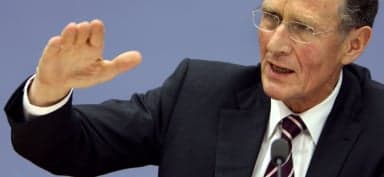Rürup says full employment possible in a decade

Full employment in Germany could step from the shadows of May Day wishful thinking to reality within a decade, the government’s chief economics "wise man" Bert Rürup said on Thursday.
Rürup said an unemployment rate of four percent - widely considered full employment by economists - could be attainable if current labour law reforms were continued and extended.
Speaking in an interview with the regional German daily, Westdeutschen Zeitung, Rürup said, “When I was studying, in 1968/69, one spoke of full employment in Germany when the unemployment was less than one percent. Today you would speak of full employment when the unemployment rate reached or was under four percent. And four percent is possible in the coming decade in Germany, but not in this economic cycle right now, which is losing dynamism.”
He warned the government not to waste the reform dividends of the last government, which had set the scene for large changes, and called for a successor to the Agenda 2010 set of reforms.
The new reforms should include the possibility for labour unions to help in job creation, for more flexible dismissal procedures and the further development of social security provision to bridge the gap between low wages and state support.
ddp/dpa
Comments
See Also
Rürup said an unemployment rate of four percent - widely considered full employment by economists - could be attainable if current labour law reforms were continued and extended.
Speaking in an interview with the regional German daily, Westdeutschen Zeitung, Rürup said, “When I was studying, in 1968/69, one spoke of full employment in Germany when the unemployment was less than one percent. Today you would speak of full employment when the unemployment rate reached or was under four percent. And four percent is possible in the coming decade in Germany, but not in this economic cycle right now, which is losing dynamism.”
He warned the government not to waste the reform dividends of the last government, which had set the scene for large changes, and called for a successor to the Agenda 2010 set of reforms.
The new reforms should include the possibility for labour unions to help in job creation, for more flexible dismissal procedures and the further development of social security provision to bridge the gap between low wages and state support.
ddp/dpa
Join the conversation in our comments section below. Share your own views and experience and if you have a question or suggestion for our journalists then email us at [email protected].
Please keep comments civil, constructive and on topic – and make sure to read our terms of use before getting involved.
Please log in here to leave a comment.